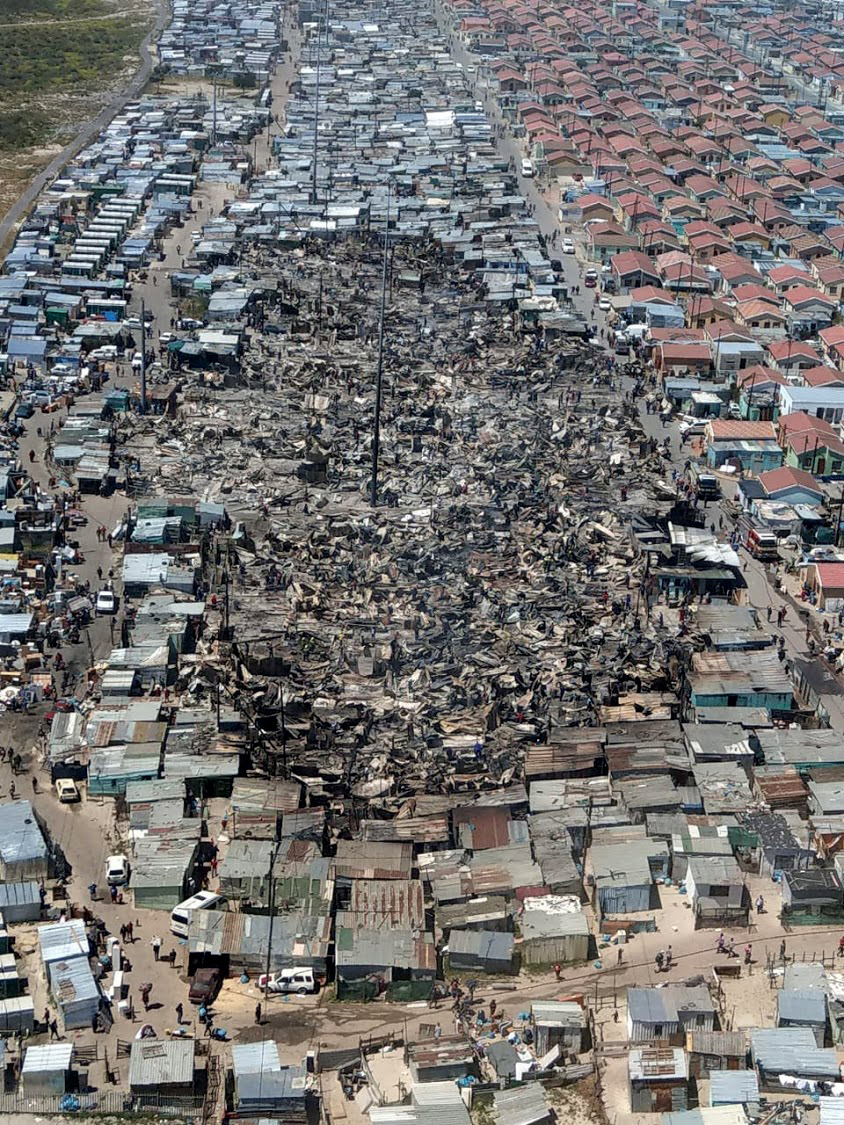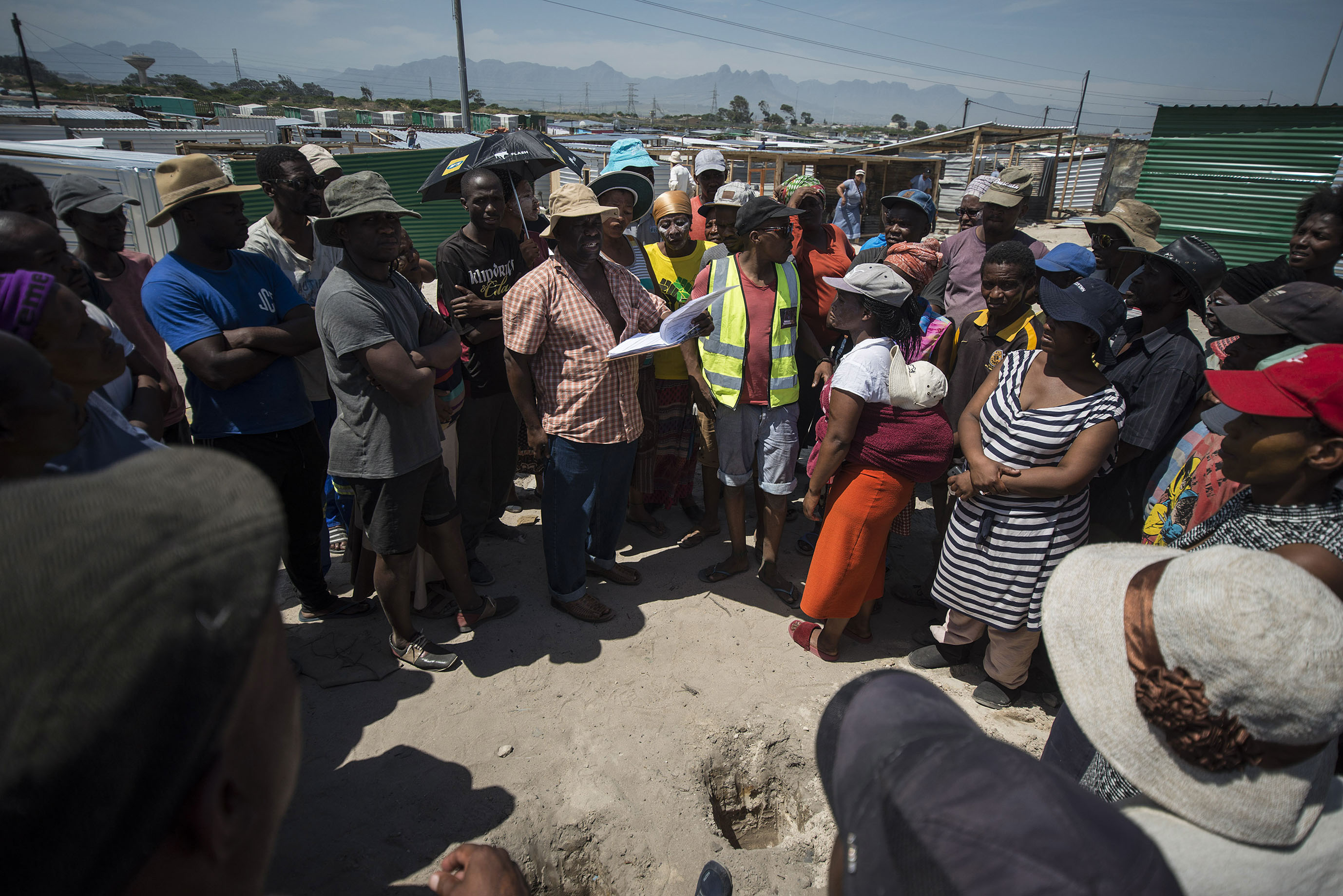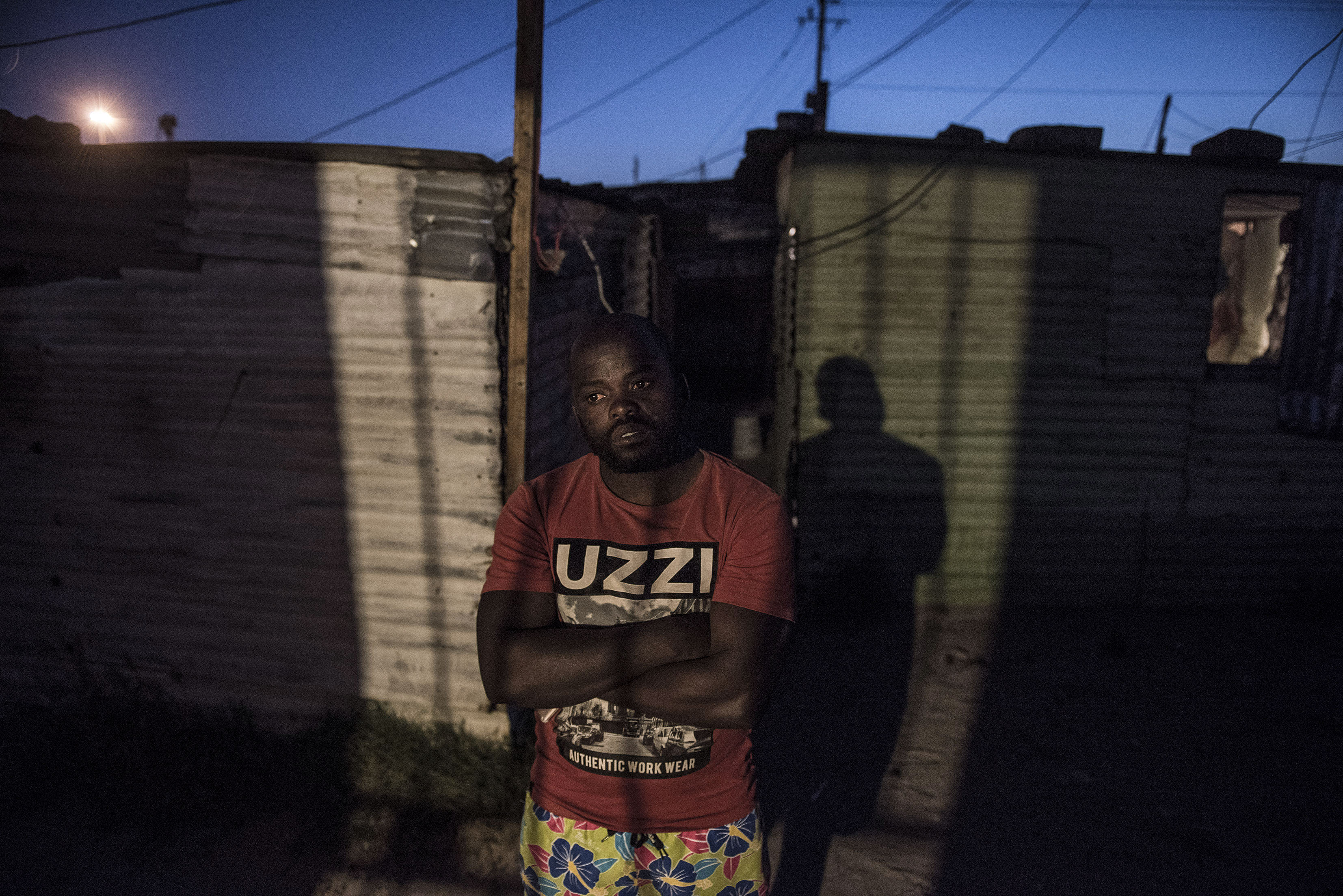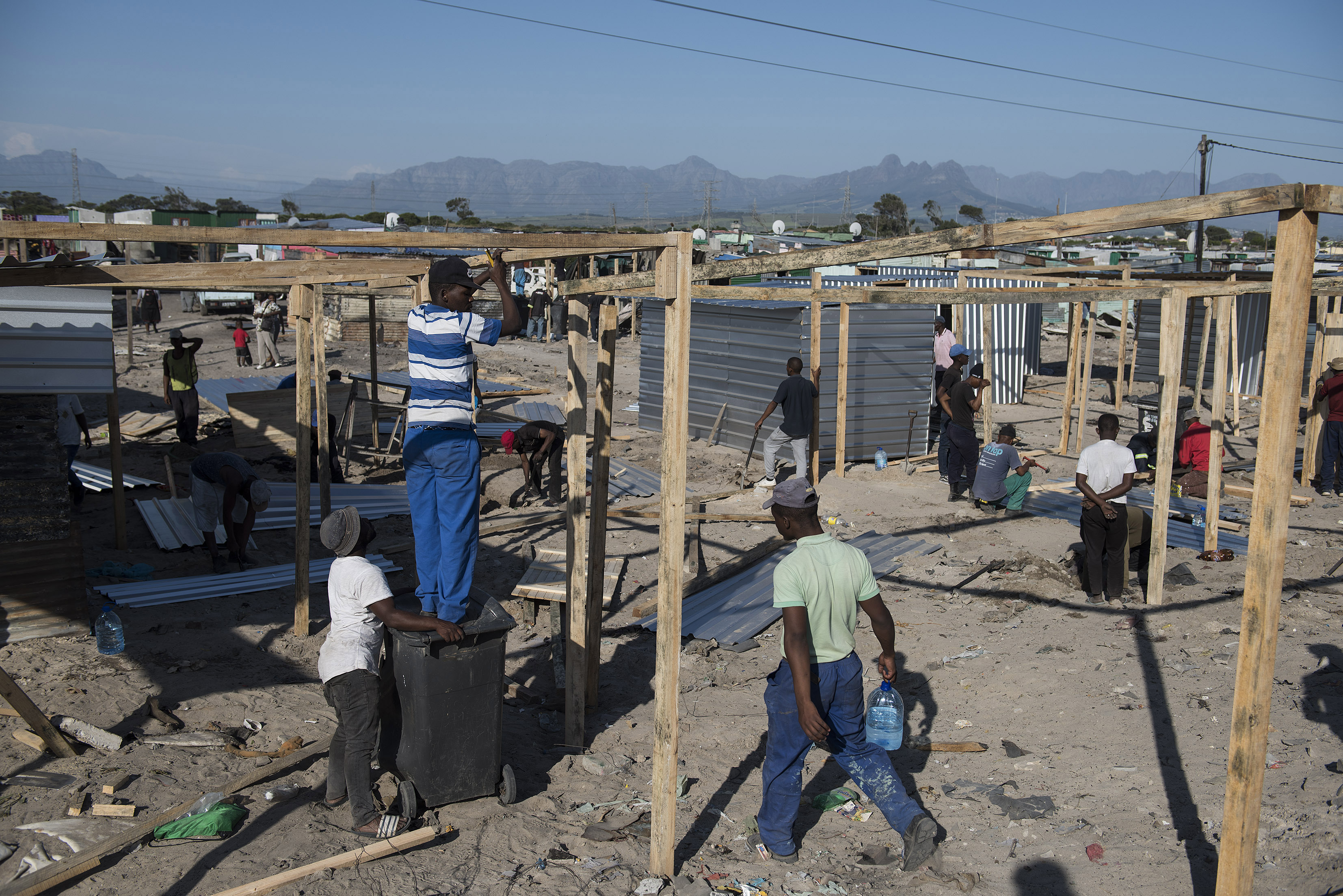Residents receive a new shack building kit which comprises zinc sheets and other bits laid side by side. (David Harrison)
Thuliswa January, like many others who lost their homes in the fire that left over 1 300 Khayelitsha residents homeless last weekend, blames the devastation wrought by the blaze on the limited space they have to erect their shacks.
On Tuesday evening, January stands on the sidelines as her husband, Nkosinathi, uses the materials sent to the scene by the City of Cape Town to rebuild their home — “back to back” with others.
January speaks loudly so she can be heard over the sound of Nkosinathi’s hammer colliding with the new sheets of zinc. She points to the 60cm corridor between their and their neighbour’s newly built shacks, saying: “It is going to happen again.” January later repeats this sentiment, her voice now straining to be heard over the hammering.
In the early hours of last Saturday, a fire broke out in Silver Town, Khayelitsha, gutting more than 300 homes. One person reportedly died.
There’s a photograph of the aftermath that has been circulated on social media. It shows a dark depression in the landscape of the Cape Town township — like a footprint left by a monstrous force.

(JP Smith)
As residents rebuild their homes, provincial and local government say there are plans to improve living conditions in the area. But residents are not convinced.
January wasn’t home when the fire started. She and her family — Nkosinathi and their two children — were visiting her mother in adjacent Town 2. She only heard about what had happened in the fire when a neighbour told her on her walk back to the site of her home.
“I didn’t want to come home because I was afraid to see what happened. I waited for my husband to return from work,” she says.
What they found was a patch of ash where their small home, which once housed the bed in which all four slept, used to be.
January says she wrote to the City of Cape Town 10 years ago to complain about the conditions in the informal settlement. She says she wanted government officials to inspect the place, but they never did.
She says that, despite the recent tragedy, and the apparently renewed public interest in the lives of Khayelitsha shack dwellers, not much has changed.
After the tragedy, and the circulation of the picture of its effect, aid — mostly food and clothing — has been sent to the victims of the fire. Drives to raise supplies are being advertised on social media.
But the only evidence of this is the odd polystyrene container propped in the white beach sand of the township. Many say they have been wearing the same clothes for days now.
Officials still won’t visit the scene of the tragedy, choosing instead to address residents on the outskirts of Silver Town, January says. “We only saw them on the TV. They never came to where the disaster really is.”
Reblocking
Western Cape Human Settlements MEC Bonginkosi Madikizela did visit the township on Saturday afternoon. He reportedly made a plea to residents to clear the site before erecting new structures.
January exaggerates every syllable of the MEC’s name. She says government officials like him have failed them. “They keep telling us that they were going to negotiate land for us. Since we voted in 1994, they have told us this … All they do is speak at Parliament and then go to their houses, their mansions. They have left us, but they must speak for us.”
Khayelitsha residents talk about promises made to them by Madikizela and others, involving moving some of them out of Silver Town to another location to open up more space. No one knows where they will be relocated to if this does happen.

Residents wait for their names to be called to receive a new shack building kit. (David Harrison)
Spokesperson for the Western Cape department of human of settlements, Nathan Adriaanse, says that in the meantime it is implementing its informal settlement support plan, “which provides a clear roadmap to address the challenges faced by informal settlement residents”.
The department has prioritised the upgrading of informal settlements in the province, Adriaanse said.
The City of Cape Town’s MEC for transport and development Brett Herron says the city approved a new municipal spatial development framework (MSDF) in April. The framework will pursue new forms of city planning with the aim of making Cape Town more spatially equitable, he says.
“The very purpose of the MSDF is to reverse the legacy of separate development by promoting integration, inclusivity and by providing housing opportunities on well-located land where lower-income households will have better and easier access to economic opportunities,” Herron adds.
Adriaanse says that, in the wake of shack fires, authorities have been working on “reblocking” the site of the devastation to allow for easy access of fire and disaster response assistance.
A 2013 City of Cape Town document describes reblocking of informal settlements as “a community-led process of reconfiguring the current layout of informal settlements by grouping shacks into clusters and reorganising the ground plan in such a manner as to optimally utilise space to promote the health, safety [and] wellbeing of households”.
But as people rebuild their homes, it becomes evident that the structures will be as close to one another as they were before — if not closer.
Most have been erecting their shacks where they were before. Quarrels between neighbours sometimes break out over the exact plotting of the land.
‘Mind games’
Sibulele Rathiya, from the Khayelitsha-based Progressive Youth Movement, says that those who were first to receive the new materials also got first pick of the land and that the kits should all have been distributed at once to avoid this.

Sibulele Rathiya, from the Khayelitsha-based Progressive Youth Movement, says politicians play mind games to get votes. (David Harrison)
Standing on the edge of the scene of the fire on Tuesday evening, Rathiya points to a series of outdoor toilets unharmed by the blaze.
Rathiya says the situation in the township raises the same feelings people experienced during the 2016 case of Sinoxolo Mafevuka, who was raped and murdered on her way to the communal toilets one night.
Rathiya uses what happened to Mafevuka as an example of what he says is government’s disregard for the needs of those living in the township. At the time Khayelitsha residents called on government to do away with the communal toilets altogether.
“It is the same now,” he says. “It’s a mess. We can’t manage and we don’t know what to do.”
The general secretary of the shack residents movement Abahlali base-Mjondolo, Thapelo Mohapi, says
he was “very disappointed” by some of the remarks made by Madikizela in the wake of the Khayelitsha tragedy.
Madikizela reportedly said: “We must not assume that every shack is an indication of a housing need. Some people who are living in shacks are coming from very beautiful homes. They come to cities like Cape Town looking for work and live in shacks.”
Mohapi says the MEC clearly has no idea about what is actually happening in townships.
He can sympathise with the residents of Silver Town, he says, because he lost his home in a 2012 fire in Briardene, Durban. When officials asked him what he had lost in the fire, and he said a TV and a wardrobe, he was dismissed as having the money to afford a house.
These comments betray a preconception that people living in shacks “should not be living like human beings”, Mohapi says.
On Wednesday, as Cape Town’s Informal Settlements Management Unit lays out the last of 342 shack building kits distributed this week, Rathiya echoes this sentiment.
His forehead glistens with sweat in the 33°C heat. “The way that I feel is that they don’t treat us as South Africans at all,” he said. “But when they talk to journalists they will say we’ll deal with the townships now now. Then they will go away.”
Politicians flock to Khayelitsha in times of tragedy, he says, because they need the votes of those living in townships come election time. He is frustrated that no one has asked residents what they actually need. “They are playing mind games with us,” he says.
The more things change
The allocation of the shack building kits takes hours, as members of the Informal Settlements Management Unit — with the help of the Anti-land Invasion Unit — lay out the 50 or so kits item by item. Each contains zinc sheets, wooden poles, hinges, nails, a door and a window.

(David Harrison)
Asavela Jack, who is waiting for materials so he can help to rebuild his sister’s home, scoffs at the idea that they would need only one window.
Most of the new structures will be built using a combination of the new materials, the old zinc sheets blackened by the fire and — if they can afford it — new materials paid for by residents. Adjacent to where the kits are being laid out, a group of men panel beat the zinc sheets damaged by the blaze, jumping on the crumpled sheets to straighten them out.
Vulisango Mbela says those living in Silver Town “don’t tolerate each other”.
“Because what we have to do is make sure two metres between the shacks. But it is not happening because everybody wants to have a big house. That is what is killing us,” he says. He points out that it is almost December, when the heat and wind in Cape Town are at their most violent, and that it is likely that there are more fires to come.
“And it’s going to be difficult again. We will lose everything again.”
This week the Western Cape is experiencing a heatwave, with temperatures reaching up to 40°C in some regions. The day after the Khayelitsha fire, another fire tore through the Kosovo informal settlement in nearby Philippi. Several other blazes have sprung up in the province.
Mbela sits next to Ma Nkomo in the shade of a half-finished shack. The calamine lotion on her face crumbles at her smile lines.
She has lived in the area since her 18-year-old grandson was born. Before she moved to Silver Town, Ma Nkomo lived 2km away in Makhaza — where the infamous open-air toilet saga transpired.
Ma Nkomo says not much has changed in the many years she has lived in Khayelitsha.
“Nothing ever changes here. The only thing that is different is that more people come to live here.”